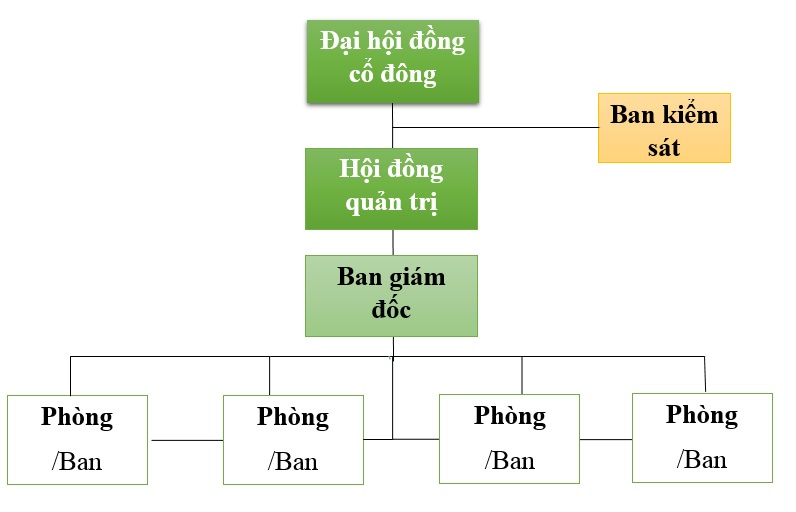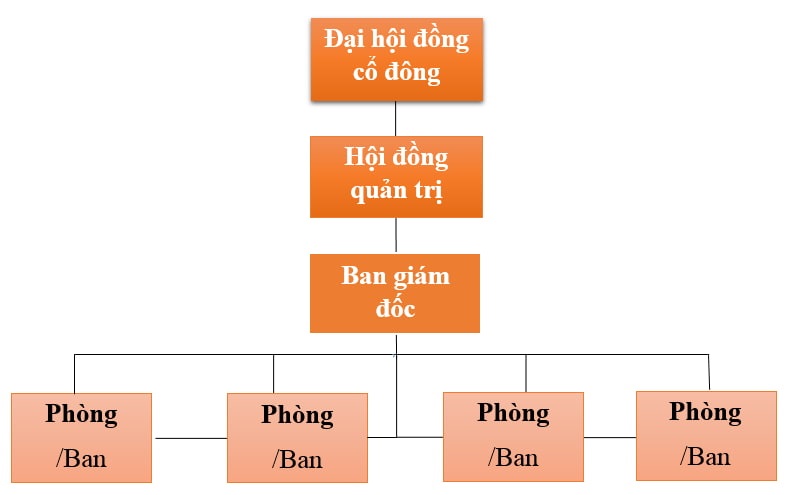What is the organizational structure of a joint stock company in Vietnam according to the Law on Enterprise 2020? What is the supreme body of a joint stock company?
- What is the organizational structure of a joint stock company in Vietnam according to the Law on Enterprise 2020?
- What is the supreme body of a joint stock company in Vietnam?
- What are the regulations on the rights and obligations of the General Meeting of Shareholders in Vietnam?
- What are the obligations of shareholders of a joint stock company in Vietnam?
What is the organizational structure of a joint stock company in Vietnam according to the Law on Enterprise 2020?
Pursuant to Article 137 of the Law on Enterprises 2020, it is stipulated that unless otherwise prescribed by securities laws, a joint stock company may choose one of the following models:
Model 1 | Model 2 |
- General Meeting of Shareholders (GMS) - Board of Directors - Board of Controllers and Director/General Director - Board of Controllers | - GMS - Board of Directors - Board of Controllers and Director/General Director |
If the joint stock company has fewer than 11 shareholders and the shareholders that are organizations hold less than 50% of the company’s total shares, a Board of Controllers is not mandatory; | At least 20% of the members of the Board of Directors shall be independent members and there has to be an audit committee affiliated to the Board of Directors. The organizational structure, functions and duties of the audit committee shall be specified in the company's charter or the audit committee’s operating regulations promulgated by the Board of Directors. |
From the above organizational model, one can imagine the organizational chart of a joint stock company.
Below is the organizational structure of a joint stock company (for reference):
Model 1:

Model 2:


What is the organizational structure of a joint stock company in Vietnam according to the Law on Enterprise 2020? What is the supreme body of a joint stock company?
What is the supreme body of a joint stock company in Vietnam?
Pursuant to the provisions of Article 138 of the Law on Enterprises 2020 on the rights and obligations of the General Meeting of Shareholders, the content is as follows:
Rights and obligations of the GMS
1. The GMS shall consist of all voting shareholders and is the supreme body of a joint stock company.
...
Thus, The GMS (shall consist of all voting shareholders) is the supreme body of a joint stock company.
What are the regulations on the rights and obligations of the General Meeting of Shareholders in Vietnam?
Pursuant to the provisions of Article 138 of the Law on Enterprises 2020, the GMS has the following rights and obligations:
- Ratify the orientation for development of the company;
- Decide the types of authorized shares and quantity of each type; decide the annual dividends of each type of shares;
- Elect, dismiss members of the Board of Directors and Controllers;
- Decide investment in or sale of assets that are worth at least 35% of the total assets written in the latest financial statement, unless another ratio or value is specified in the company's charter;
- Decide revisions to the company’s charter;
- Ratify annual financial statements;
- Decide repurchase of more than 10% of total sold shares of each type;
- Take actions against violations committed by members of the Board of Directors and Controllers that cause damage the company and its shareholders;
- Decide reorganization or dissolution of the company;
- Decide the budget or total salaries, bonuses and other benefits of the Board of Directors and the Board of Controllers;
- Approve the rules and regulations of the company, the Board of Directors and the Board of Controllers;
- Approve the list of independent audit companies; choose independent audit companies carry out audit of the company; dismiss independent audits where necessary;
- Other rights and obligations prescribed by Law and the company's charter.
What are the obligations of shareholders of a joint stock company in Vietnam?
Pursuant to the provisions of Article 119 of the Law on Enterprises 2020 as follows:
Obligations of shareholders
1. Fully and punctually pay for their subscribed shares.
2. Do not withdraw contributed capital in the form of ordinary shares in any shape or form, unless the shares are purchased by the company or other persons. The shareholder that withdraws all or part of the share capital against regulations of this Clause and persons with related interests in the company shall have a liability for the company’s debts and other liabilities which is equal to the value of the shares withdrawn and the damage caused by this action.
3. Comply with the company's charter, rules and regulations.
4. Comply with resolutions and decisions of the Board of Directors and the GMS.
5. Protect the confidentiality of information provided by the company in accordance with the company's charter and the law; only use the provided information to perform and protect their lawful rights and interests; do not spread or share information provided by the company to any other organization or individual.
6. Other obligations prescribed by Law and the company's charter.
Accordingly, shareholders in a joint stock company must perform the following obligations:
- Fully and punctually pay for their subscribed shares.
- Do not withdraw contributed capital in the form of ordinary shares in any shape or form, unless the shares are purchased by the company or other persons. The shareholder that withdraws all or part of the share capital against regulations of this Clause and persons with related interests in the company shall have a liability for the company’s debts and other liabilities which is equal to the value of the shares withdrawn and the damage caused by this action.
- Comply with the company's charter, rules and regulations.
- Comply with resolutions and decisions of the Board of Directors and the GMS.
- Protect the confidentiality of information provided by the company in accordance with the company's charter and the law; only use the provided information to perform and protect their lawful rights and interests; do not spread or share information provided by the company to any other organization or individual.
- Other obligations prescribed by Law and the company's charter.
LawNet